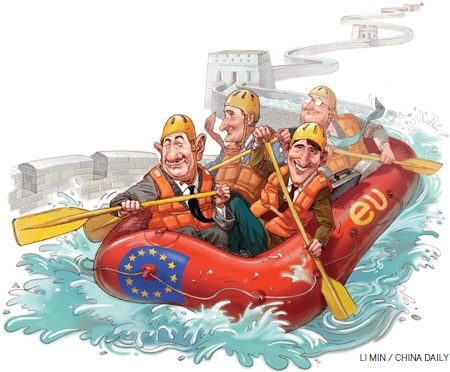Thrills - and some spills
Updated: 2010-12-01 14:43
By Andrew Moody (China Daily)

The volume of trade between China and the European Union has increased more than five-fold from $69 billion (50.8 billion euros) in 2000 to $364 billion in 2009.
Last year's figure was, in fact, dampened by the economic crisis - in 2008, it actually stood at $425 billion - a more than sixfold increase on eight years before.
Although the world's attention is often on the trade relationship between the United States and the protracted row over the value of the yuan, the EU is China's largest trading partner, biggest export market and largest source of technology imports, according to China's Ministry of Commerce.
Wuttke, who has been with BASF for 13 years and who was president of the European Chamber of Commerce in China from 2007 until earlier this year, has seen the impact of China's growth on his own company. It had revenues of 4.1 billion euros in 2009 and employs 7,000 at 38 factories.
"What we are seeing is China moving back to the position it used to occupy, producing a third or a fourth of the world's GDP. The last 200 years were just an abnormality," he says.
With any such sudden ascendancy or re-assertion of economic status issues are bound to arise.
While trade between Europe and China has grown over the last 10 years, particularly since China's accession to the World Trade Organization (WTO) in 2001, the relationship has been marred by a few nagging issues.
China accuses the EU of protectionism since it will not give it Market Economy Status (MES) like it has to many other developing nations.
As a result, China's exports to the EU often fall foul of anti-dumping measures since their price is often calculated as being below their production cost.
This is because without MES, China's actual production costs are not taken into account. Instead, they are calculated on a basis of comparing them to what they would be in other countries.
Unfortunately for China, direct comparisons have often been with countries where unit labor costs are much higher with even the US sometimes being used. Beijing complains the system is hopelessly rigged against it.
On the other hand, many companies from the EU believe they are being denied full access to China's market, particularly in service industries such as banking and financial services.
They also believe they are faced with ever increasing regulation and red tape, which they claim is putting a brake on trade and investment.
E-paper

Ear We Go
China and the world set to embrace the merciful, peaceful year of rabbit
Preview of the coming issue
Carrefour finds the going tough in China
Maid to Order
Specials

Mysteries written in blood
Historical records and Caucasian features of locals suggest link with Roman Empire.

Winning Charm
Coastal Yantai banks on little things that matter to grow

New rules to hit property market
The State Council launched a new round of measures to rein in property prices.
